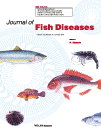Haematological and Biochemical Reference Intervals Towards a Proactive Health Monitoring Approach in Norwegian Atlantic Salmon Farming

Abstract
Haematological and plasma parameters are used in veterinary medicine as a diagnostic tool, allowing for the early detection of potential health and welfare issues. For the implementation of monitoring strategies, reference intervals (RIs) are needed to know when deviations in those parameters become clinically relevant. Here, haematological and plasma biochemical RIs of Norwegian Atlantic salmon ( Salmo salar Linnaeus) are presented for 29 biomarkers. Two subgroups were defined from the reference population based on water type, referred to as pre‐adult (freshwater, 166.8 ± 118.4 g, N = 979) and adult (seawater, 2655 ± 2883 g, N = 4941), collected at 93 fish farms along the Norwegian coast. While the influence of various pre‐analytical variables on RIs is well documented, aquaculture practitioners cannot always control those variables in the field. Here, RIs were calculated from blood samples collected based on local pre‐analytical practices and then further processed under standardised conditions (analytical phase). RIs are therefore considered highly relevant for the application in the field. Finally, when taking blood samples in the field, it is advised to centrifuge whole blood as soon as possible, while plasma parameters investigated were stable for 168 h at 4°C or 72 h at room temperature.
